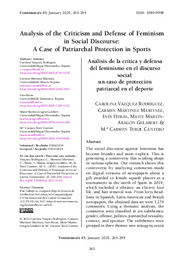Por favor, use este identificador para citar o enlazar este ítem:
https://hdl.handle.net/11000/35871Registro completo de metadatos
| Campo DC | Valor | Lengua/Idioma |
|---|---|---|
| dc.contributor.author | Vázquez Rodríguez, Carolina | - |
| dc.contributor.author | Martínez, Carmen | - |
| dc.contributor.author | Herás, Inés | - |
| dc.contributor.author | MARTÍN-ARAGÓN GELABERT, MAITE | - |
| dc.contributor.author | Terol Cantero, M Carmen | - |
| dc.contributor.other | Departamentos de la UMH::Ciencias del Comportamiento y salud | es_ES |
| dc.date.accessioned | 2025-03-10T08:33:56Z | - |
| dc.date.available | 2025-03-10T08:33:56Z | - |
| dc.date.created | 2025-01 | - |
| dc.identifier.citation | Feminismo/s, 265-294 - January 2025 | es_ES |
| dc.identifier.issn | 1989-9998 | - |
| dc.identifier.uri | https://hdl.handle.net/11000/35871 | - |
| dc.description.abstract | Abstract The social discourse against feminism has become broader and more explicit. This is generating a controversy that is taking shape in various spheres. Our research shows this controversy by analyzing comments made on digital versions of newspapers about a gift awarded to female squash players at a tournament in the north of Spain in 2019, which included a vibrator, an electric foot file, and hair removal wax. From forty headlines in Spanish, Latin-American and British newspapers, the obtained data set were 1,279 comments. Using a thematic analysis, the comments were classified in six subthemes: gender, offense, politics, patriarchal sexuality, context, and sponsor. The subthemes were grouped in three themes: new misogyny, sexist outrage and corporate advocacy. Two conflicting discourses, both based on two opposites men/women, equality/discrimination, show the social and political conflict in Spanish society. However, the sponsoring company is not questioned. Gender appears as a performative act whose reproduction maintains a tense relationship between what is presented as two different images of women: real/normal versus feminist. Results indicate that the comments reflect deep-rooted attitudes about gender and power, using ambivalent sexism and anti-feminist rhetoric to maintain the status quo, and how corporate sponsorship is presented as a justification mechanism. The debate focuses on the social discourse that pits the feminist model against the patriarchal one, understood as an epistemological stance. From the so-called new misogyny, which presents men as discriminated against, a false parallelism is used that misrepresents the concept of equality, accepts a pre-discursive order on women’s sexuality and neoliberalism through the defence of the corporate market. | es_ES |
| dc.format | application/pdf | es_ES |
| dc.format.extent | 30 | es_ES |
| dc.language.iso | eng | es_ES |
| dc.publisher | Universidad de Alicante | es_ES |
| dc.rights | info:eu-repo/semantics/openAccess | es_ES |
| dc.rights.uri | http://creativecommons.org/licenses/by-nc-nd/4.0/ | * |
| dc.subject | women | es_ES |
| dc.subject | patriarchy | es_ES |
| dc.subject | neosexism | es_ES |
| dc.subject | feminism | es_ES |
| dc.subject | modern misogyny | es_ES |
| dc.subject | social discourse | es_ES |
| dc.subject | equality | es_ES |
| dc.subject | thematic analysis | es_ES |
| dc.subject | sportswomen | es_ES |
| dc.subject.other | CDU::1 - Filosofía y psicología::159.9 - Psicología | es_ES |
| dc.title | Analysis of the Criticism and Defense of Feminism in Social Discourse: A Case of Patriarchal Protection in Sports | es_ES |
| dc.title.alternative | Análisis de la crítica y defensa del feminismo en el discurso social: un caso de protección patriarcal en el deporte | es_ES |
| dc.type | info:eu-repo/semantics/article | es_ES |
| dc.relation.publisherversion | https://doi.org/10.14198/fem.2025.45.10 | es_ES |

Ver/Abrir:
Analysis of the Criticism and Defense of Feminism....pdf
310,21 kB
Adobe PDF
Compartir:
 La licencia se describe como: Atribución-NonComercial-NoDerivada 4.0 Internacional.
La licencia se describe como: Atribución-NonComercial-NoDerivada 4.0 Internacional.
.png)